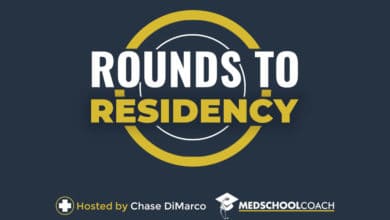Residency Director Dr. Biernacki provides helpful tips to help you through residency processes and surviving clinical rotations.
Dr. Tom Biernacki is a Residency Director in podiatric medicine. Similar to MD (allopathic physician) and DO (osteopathic physician) degrees, the DPM degree requires four years of medical school. They also have a mandated three-year residency, which is similar to many specialties in MD/DO pathways. It holds the most overlap with the medical specialty of orthopedics. However, podiatry handles many chronic diseases of the foot and ankle without the emergency and trauma care scenarios that an orthopedic surgeon may.
He states that preceptors that are patient and understanding with their students provide a greater support structure and more clinical education benefit. Those that are frequently angry, hurried, and condemning of their students are still in existence, and it may be difficult for a student to navigate these educational environments. Retention of information from these poor preceptors will likely be hampered by this negative learning avenue. Compassion for your students ultimately leads to better education and often better patient care.
He cautions residents and new preceptors not to move too fast in their clinical practice. It is easy to see the seasoned and experienced physicians moving efficiently and swiftly and wishing to do the same. Much of this comes with experience and it’s more important that every clinical educator and physician moves at their own pace. Speed can lead to patient safety concerns and other mistakes. It’s alright for physicians to admit when they need to gather their thoughts, when they need a break, and when they need help.
Dr. Biernacki also recommends that students show humility to their preceptors, other students, and the staff. No one appreciates a student that shows off and attempts to demonstrate superior knowledge to other staff members. This attitude and work ethic reflects more poorly on the student than poor grades or weak exam scores. Being open to learning is the key to being a great student, as is supporting your team and colleagues. People skills and professionalism increase in importance during the residency selection process as well. And, as always, remember that “perfection” is not the goal. Enjoy your clinical experiences and you will derive much greater total benefit from the time spent.
Students are there to learn, but Dr. Biernacki warns that some students may incorrectly think that asking many questions counts as academic engagement. This can become problematic and interrupt the day’s routines. It is important to not become a burden to your preceptor or others around you. When you make your preceptor’s job easier that allows them more time to focus on your education and guidance as well. If listeners and readers were to take one thing away from this interview it would probably be this: “be a pleasant person to be around.” This can go very far in displaying a positive work ethic and forming a support system with your colleagues.
Resources
